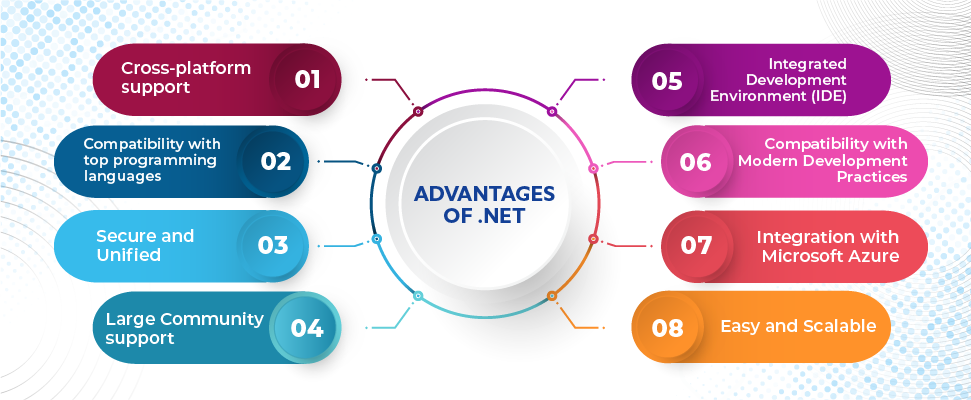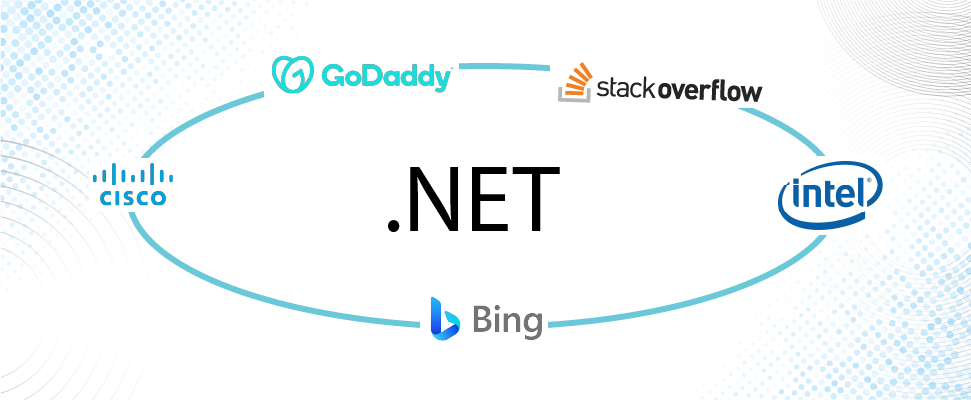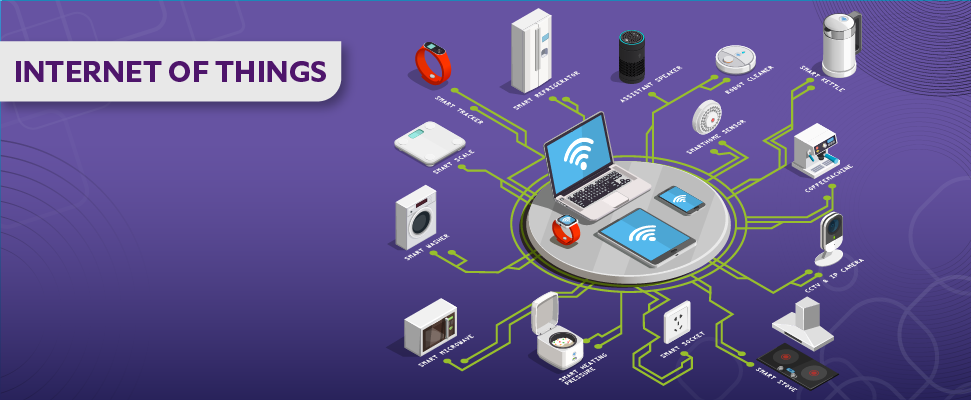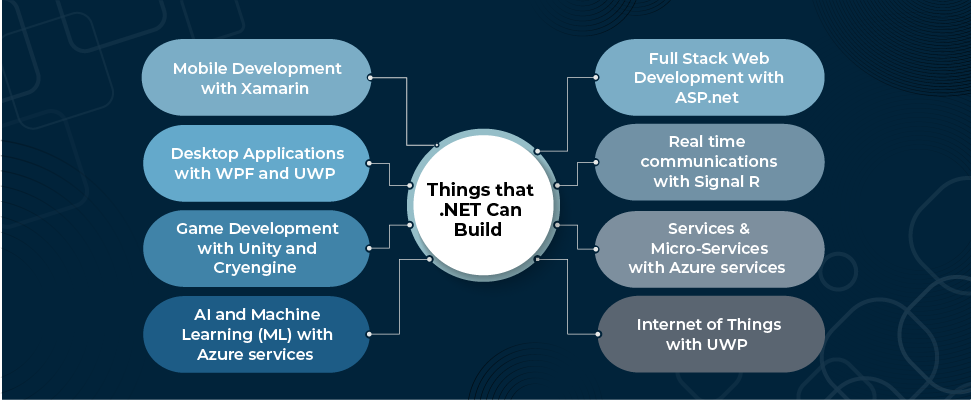Table of Contents
ToggleIntroduction
Since its launch in 2002, Microsoft’s .NET Framework has been helping developers around the world create agile, scalable apps for desktop, web, and mobile. Not only this, but .NET developers also build cloud-native applications, games, and Internet of Things (IoT) devices. .NET is a free, open-source platform chosen by developers all around the world for its reliable features. In this blog, we give you an overview of the relevance of .NET in 2023 and its future scope.

Don't miss out on your chance to work with the best
apply for top global job opportunities today!
Why is .NET Popular?
According to Evans Data Corporation’s latest report, the number of software developers is predicted to go up to 28.7 million in 2024. Five million of these software developers are expected to be .NET developers. Many developers embrace the.NET technology because it is a standardized software development framework. It offers a versatile and robust environment for app development. Its extensive library, security features, and compatibility with modern development practices also make it a popular choice among developers and businesses. Moreover, its continuous evolution with upgraded features and benefits makes it desirable. Its wide scope of application includes building apps for IoT devices. In recent years, there has been an increase in IoT–connected devices, indicating a growing demand for .NET developers skilled in building apps for IoT.
Let’s look in detail some of its desirable features that makes its popular:
Cross-platform support: .NET’s popularity is mainly due to its cross-platform compatibility. Cross-platform support is an essential feature that helps create different apps including desktop, machine learning, mobile, desktop, cloud, IoT, etc. in 2024’s diverse digital environment.
Compatibility with top programming languages: .NET is compatible with popular programming languages such as C#, F#, and VB.Net. This opens a wide arena for developers allowing them to choose the language that they are most comfortable with.
Security: .NET is a Microsoft product and businesses across the world trust Microsoft with their official data. Microsoft comes up with new upgrades regularly to combat security issues. Thus, being a Microsoft baby, .NET is also trusted by millions of developers and businesses.
Large Community support: .NET has huge support from around 5,000,000 .NET developers worldwide. Developers and businesses can leverage this large ecosystem to find solutions to technical challenges.
Integrated Development Environment (IDE): Visual Studio is the flagship IDE of Microsoft for .NET development. It offers features such as profiling, debugging, and code analysis, thus improving productivity and streamlining the software development process.
Compatibility with Modern Development Practices: .NET offers great features, such as microservices architecture and containerization that is compatible with modern development practices. This makes .NET a great option for developing modern, cloud-native applications.
Integration with Microsoft Azure: Businesses using Azure, Microsoft’s cloud platform, will find .NET a boon as it seamlessly integrates with Azure. This way companies can make use of Azure and develop end-to-end solutions.
A unified platform: With the launch of .NET 5, Microsoft has come up with a unified platform that brings together .NET Framework and .NET Core, thus simplifying the development environment.
Ease of use: The platform offers tools, such as the Visual Studio suite, for developers to write code faster, collaborate efficiently, and test and fix their code without any hassles. Further, .NET developers can help bring down costs, and .NET allows you to reuse code between implementations.
Scalable platform: .NET offers the scalability required to handle increasing workloads. Whether you are building a small business application or a large-scale enterprise system.

Is .NET Relevant in 2023?
Yes, according to Stack Overflow 2023 survey, .NET, specifically, .NET 5+ leads the pack of frameworks by around 25.29% respondents voting for it. On the fourth place is .NET Framework (1.0 – 4.8) with 17.03% vote.
Apart from the above-mentioned features, the following are some of the reasons that make .NET relevant in 2023 and beyond.
Compatibility with C#
C# is one of the top 10 preferred programming languages in 2023. It is the most sought-after language among top companies such as Stack Overflow, GoDaddy, Intel, Cisco, and more, thanks to its versatility. Moreover, since it’s developed by Microsoft, C# comes in tow with a pack of integration and compatibility features. And, when C# and .NET come together, it’s fireworks!

.NET and C# offer the best development solutions to create applications from desktop to web to mobile development. Moreover, they’re also perfect for developing cloud-based apps that are gaining significance in today’s tech environment.
Must Read- C++ vs C#: Which Language is Best for Your Project?
The Boom in Internet of Things (IoT)

The global IoT market was $478.36 billion in 2022. And it is rapidly increasing and projected to reach $2,465.26 billion by 2029. NET is considered a great tool for developing IoT apps as it provides cross-platform support. You can develop applications for IoT devices, including Smart TVs, smart home assistants, smartwatches, wearable health trackers, motion sensors, etc, with .NET.
With .NET, businesses can use apps on various OS platforms without the need to create separate apps for each targeted platform. The .NET platform is equipped with tools, libraries, and languages to help developers create modern, high-performance applications. Since the Internet of Things (IoT) and mobile app development complement each other, there are unlimited opportunities for .NET developers to build apps that help us stay organized, reach a location, manage money, and much more.
The use of IoT devices has given rise to an increased amount of data transfer over networks. Thus, it is important to deploy flexible technology that can handle the increasing workload and strict security measures to safeguard sensitive data. .NET offers advanced security and scalability for IoT applications. By incorporating robust security mechanisms, .NET provides developers with ways to protect their IoT programs from possible risks such as data breaches, unauthorized access, and malicious assaults. The .NET framework offers secure communication protocols, authentication processes, and encryption mechanisms to protect the privacy of transmitted data.
Growing demand from various industry sectors
Different industry sectors are increasingly using .NET mainly for its ease of use and integration with other Microsoft products that are widely used across businesses and, secondly, due to its adaptability to new technological needs and requirements.
Following are some of the industries making use of .NET
Healthcare: The healthcare sector needs .NET developers to build applications that improve treatment outcomes and make doctor-patient interactions simpler. Biosensors and wearable medical devices are two examples of how .NET with mobile IoT can help the healthcare sector evolve.
Agriculture: The agricultural sector is also witnessing the adoption of smart solutions to improve the cultivation of crops, monitor field crops, and manage livestock and greenhouses. .NET tools and libraries help developers build IoT sensors and pairing apps so that the agricultural sector can cope with famine, optimize resource allocation, and address environmental issues.
Retail: The retail industry has been receiving major upgrades, and mobile IoT applications help stores and warehouses use sensors, beacons, and cameras to reduce checkout lines, analyze and forecast customer data in real time, and track items on the shelves.
Transportation and logistics: With the collaboration of IoT and mobile technologies, transport companies can plan smart routes, monitor their vehicles, track the delivery of goods, and control conditions during transportation. This is a great opportunity for .NET developers to build applications that, for instance, help with the timely delivery of perishables in bad weather.
Automotive industry: Automotive software development services are in demand to come up with apps that deliver critical information. For instance, IoT-based apps are now used to provide data on traffic conditions and driver behavior along with air quality, tire pressure and temperature within cars. This gives .NET developers adept in C and C++ ample opportunities to work for leading car manufacturers.
Consumer IoT: Statista’s key insights on the use of wearables in 2022 indicate that 492.1 million wearables were shipped globally in 2022, while the revenue from digital fitness and well-being devices has been $68 billion in 2023.
.NET developers around the world have been in demand to build apps for smartwatches manufactured by giants like Apple and Samsung. Further, IoT is reinventing the way people design their outdoors. There is an increase in the demand for connected home appliances, smart home assistants, and even outdoor lighting and motion sensor cameras.
Cloud Integration
Cloud computing is growing in leaps and bounds. And platforms such as Microsoft Azure offer opportunities for .NET developers to develop and deploy applications in the cloud. Experience in integrating .NET applications with cloud services could be significant.
Machine Learning and .NET
When it comes to developing apps using ML and creating unique algorithms, and modules, the latest .NET technology – ML.NET is there to help you. It is Microsoft’s open-source ML framework that allows developers to develop customized machine-learning models. With each release, ML.Net continues to improve performance capabilities. It also supports deep learning, reinforcement learning, and other innovative strategies, which results in building more sophisticated machine-learning models. Moreover, the .NET project improves experiences, detects frauds, predicts growth, and learns customer behaviors. ML models use languages like F# and C# without moving to platforms other than .NET.
Growing popularity of Blazor
Around 31,826 live websites use Blazor as of 2023. Blazor is a framework used for developing interactive web applications using C# and. NET. It has gained traction since its release in 2018. Blazor is a front-end web framework that enables .NET developers to build web apps without the need to learn JavaScript.
Regular .NET Version Upgrades
Regular .NET version upgrades provide improvements and features that are suitable for modern software development practices. The latest version, .NET 8.0, was released in November 2023. Microsoft .NET 8 offers improved performance, stability, and security along with enhanced platform and tooling. .NET developers, especially those into projects that build intelligent, cloud-native applications and high-traffic services that scale on demand, will find the latest .NET upgrade quite productive.
Things That .NET Can Build

A lot of things. .NET developers build websites optimized for multi-device functions. For instance, while booking a hotel stay for your holiday, you no longer have to worry if the website you checked on your laptop will be accessible on your smartphone. .NET developers build multi-device optimized websites.
Mobile apps: Xamarin, a free and open-source platform for mobile apps, allows developers to build high-performance and resilient applications for iOS, Android, tvOS, watchOS, macOS, and Windows. The apps that you currently use to check the weather or reach a location are examples of multi-platform applications built with the .NET platform.
Game apps: Some of your favorite games, like Connect 4, Minesweeper, Stardew Valley, Tetris, and Tic Tac Toe, have been created with .NET and C# and are compatible with multi-platforms.
Web apps: A lot of websites and applications, such as food delivery apps and shopping websites, have virtual assistants and chatbots, and these are also built with .NET. The .NET Framework is a great platform to integrate AI and ML features into .NET programs.
IoT device apps: .NET IoT libraries let you develop applications for IoT devices. Smart TVs, smart home assistants, smartwatches, wearable health trackers, motion sensors and even smart appliances are some of the latest consumer IoT devices that need work from .NET. These devices have technology and sensors that collect and exchange data over the Internet for smooth functioning.
Take control of your career and land your dream job
sign up with us now and start applying for the best opportunities!

Concluding Thoughts – What is the Scope of .NET in the Future?
As industries revolutionize their business operations with better apps and services, .NET is also bound to grow in popularity. The current trends, along with statistics from developer surveys, highlight the continued demand for.NET. It is a popular platform equipped with tools, libraries, and languages to build agile and resilient apps. As a .NET developer, you can use .NET on multiple platforms with C# and other languages to develop desktop, web, and mobile applications. .NET can also integrate with cloud services through Microsoft Azure and help build various types of applications for analytics and virtual computing. As the world embraces digitization more openly, .NET will be in demand to build new-age feature-rich applications that can be used seamlessly across operating systems and devices. If you are a .Net developer looking exciting job opportunities that would allow you to work with cutting-edge technologies then sign up with Olibr now!
FAQs
Yes. As more and more businesses go online, the demand for skilled .NET developers who can build cross-platform applications is on the rise.
.NET Framework is licensed as free software under the MIT License. It supports ASP.NET, ADO.NET, and Windows Forms libraries for a wide range of architectures and operating systems. It also includes C# and VB.NET compilers.
It depends on the project’s requirements. If you are building mobile applications, multi-user utility programs, embedded development and IoT-based systems, Java works best. On the other hand, companies that create multi-user applications, complex software solutions, and computer games prefer .NET.
IoT applications include home automation, security, and facility management. .NET is well-suited for developing Internet of Things (IoT) projects.
.NET Framework is part of the .NET platform that contains technologies for building apps for Linux, macOS, Windows, iOS, Android, and more. .NET Framework is a software development framework used to build and run applications on Windows.
Yes, the .NET platform is pronounced as ‘dot net.’ It is a free, open-source, managed computer software framework for Windows, Linux, and macOS operating systems.
Yes, C# is a language that works best on the Windows .NET framework.



